Newly housed South Bend residents wrestle with gratitude amid the holidays
SOUTH BEND — Julia Ippolito says it was complicated moving into her own place, just her and her dog, after years spent living on the streets or in temporary shelter.
"You go from the chaos to dead loneliness and dead quiet in unfamiliar territory or whatever," said Ippolito, who's lived in Gemini Apartments since July after years at Motels4Now's low-barrier shelter at the former Knights Inn. "It can be traumatic for some people.”
She owned a home in South Bend between roughly 2009 and 2014, she said, but it burned down. She had fallen behind on homeowners insurance payments, so the fire forced her into years of intermittent homelessness.
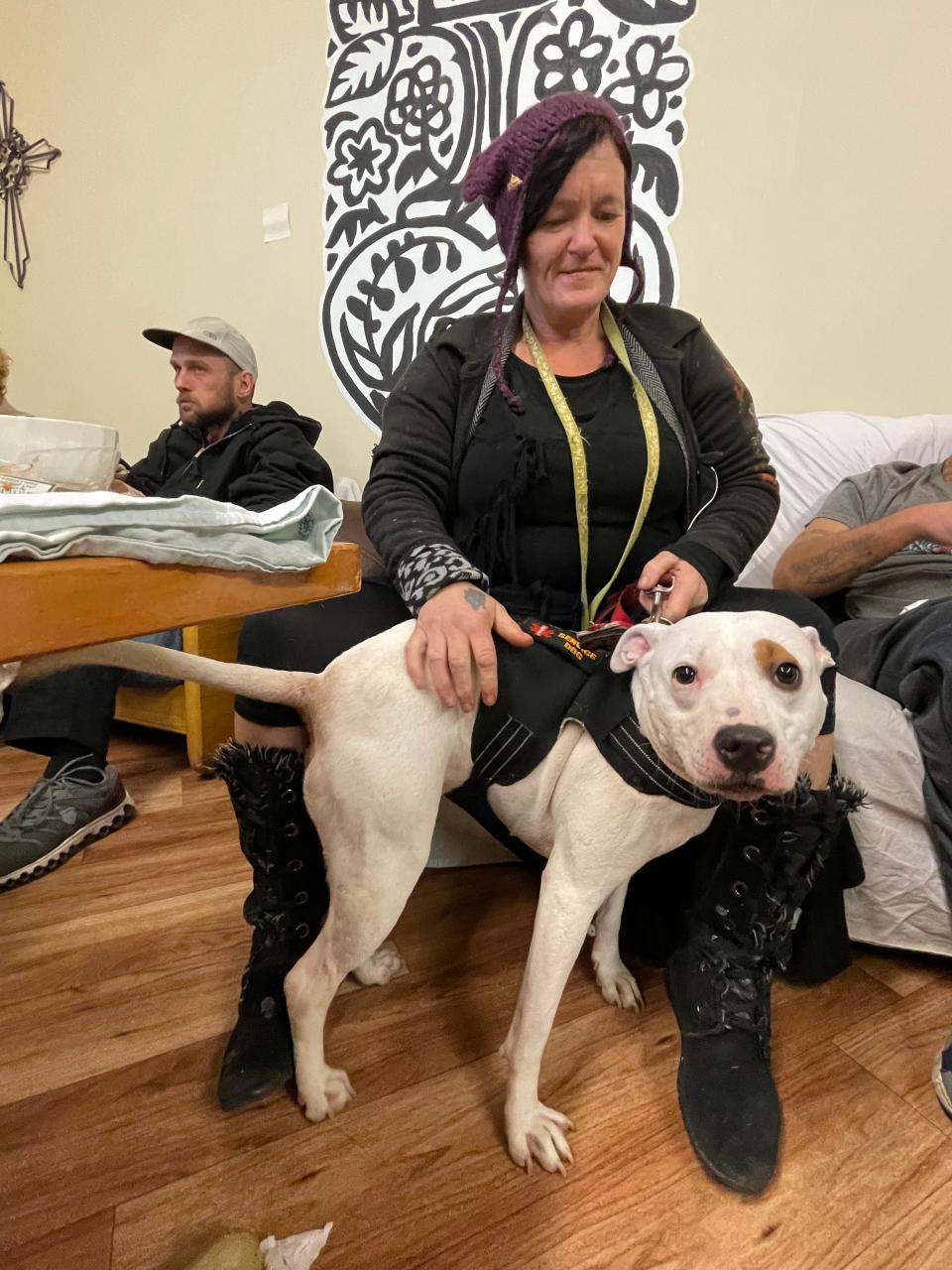
She relays this story rather nonchalantly at one of Our Lady of the Road charity's weekly breakfasts, where it's not a totally remarkable story. Food is served in a white industrial-looking building on south Main Street that's frequently packed with guests who are or recently were homeless. Lines of people enter groggily in hopes of hot coffee, eggs, French toast, laundry services, fresh shaves and community.
The last one's a big part of why Ippolito was there. She was seated alongside a few other guests on one of several couches as her psychiatric service dog, Cracker, a white pitbull mix with a dot of brown fur circling one eye, whimpered at a black puppy trotting nearby.
But a sense of belonging often eludes the 53-year-old artist who paints and carves soap sculptures. It can be worse around this time of year, Ippolito said, what with the holidays approaching. The same was true for several other people who spoke with The Tribune about their feelings toward the season, specifically toward Thanksgiving, a day on which gratitude can feel at turns harder and easier to come by.
"I’m not really a holiday person. Over the years, survival is more important," Ippolito said. "It’s very hard to relax and learn to enjoy yourself or your life when you’re surviving day to day.”
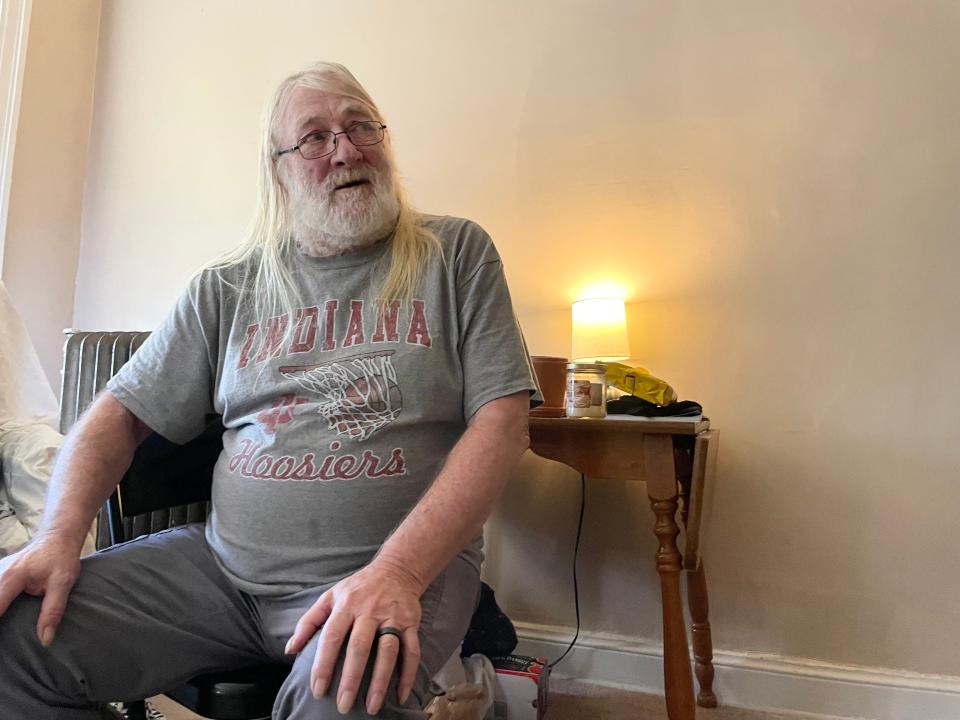
Jack Vest, a 68-year-old veteran who was homeless for five years, said he expects to be sitting alone in his new apartment on Thanksgiving. Like about a dozen other tenants at MarMain Apartments, he ended up there after a stint at Motels4Now.
A serene man who credibly notes his likeness to Santa Claus, Vest said he's felt estranged from his family all his life. On the holiday, he imagines he'll be sitting in a chair by his living-room window, the television on, a cigarette lit, its smoke slipping out through a crack that lets in the street sounds and the chilled air.
Still, he said, he's got plenty to be grateful for. The Veterans Administration promised to send him a chicken. (He was offered a turkey, but he says he lacks a pan to cook it in.) His daughter, one of five children, called him to check in the day we spoke.
And he's still upright, not even a year after a heart attack followed by quintuple coronary bypass surgery. That entailed harvesting blood vessels from his left leg to re-route blood flow around blockages in five arteries supplying his heart.
What's more, he's now climbing stairs briskly to his third-floor unit.
“I say today that girl saved my life," he says with teary eyes of a doctor who, despite his initial stubborn refusal, coaxed him into a trip to the hospital.
The woman is a doctor completing her residency at the Beacon Memorial Street Medicine clinic, which has been operating at Motels4Now more than a year now, according to Sheila McCarthy, the director of Motels4Now, who added that doctors visit the clinic every other week.
Carey Moore, 57, spent 18 years in prison and roughly 20 years homeless. A sinewy man with graying long hair and a gravelly voice, he's learned not to give a damn about Thanksgiving or birthdays when they come.
But Moore's trying to rouse himself and feel cheerful this year for the sake of his mother, who lives in Michigan and recently visited to see his new place in MarMain. A lightness entered his voice as he looked around his living room and said it's the first home he's had as an adult.
While his siblings have stayed closer with his mom — his father killed himself after a struggle with alcoholism — Moore said he's long been reluctant to ask for help. The oldest of nine children, at least two of whom he says have died, Moore wants to own his plight so he can own his escape from it.
"I was hoping she was happy — happy for me," Moore said of his mother's visit. "Because out of all those kids, I'm the only one that doesn't stay with her, pretty much. Never have. She's asked me to, because she knows I'm out on the street, but I feel that I'm a man, and I'm supposed to take care of myself."
Making a Difference: Notre Dame grad Sheila McCarthy's journey to leading Motels4Now started in a Boston homeless shelter
McCarthy said estrangement from family is the norm among hundreds of unstably housed people whom she's helped over decades of work.
In most cases, she believes, people would have benefited had they been removed from their families as children and placed into the foster care system. With painful adolescent memories in mind, most people she's known do not enjoy holidays but merely endure them.
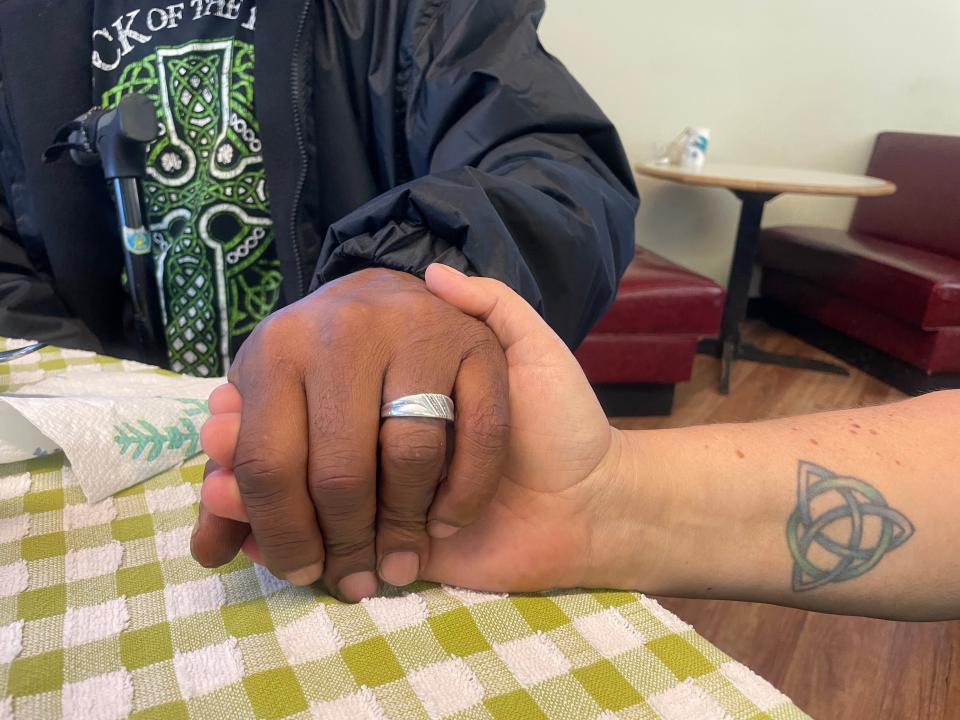
But there's also the matter of shame, which often keeps people away from family members who may long to see them. Shame begets secrets and isolation, several guests told The Tribune, and homelessness and drug addiction are two of shame's potent fuels.
Gary Michael Hogan, 61, said this year he'll try to muster the courage to talk more often to his daughters. A soft-spoken man who carefully folded his clothes at the weekly breakfast while he talked, he said he's been shunning them because he's ashamed of his joblessness, his recent prison time and his addiction. It seems so wrong to him to show up during the holidays without a casserole or any money or gifts for his girls.
“I’m not very proud of myself as far as being a father,” Hogan said. “And you know, my daughters always say, 'Dad, you don’t have to have something to come see us.' But that’s the way I feel. That’s the way a father should feel: have something for his daughters.”
Paul Kemp, 52, felt similarly evasive of his family members for years.
Once he left prison and became homeless, he no longer saw himself as a welcome guest at Thanksgiving dinners. All of his recent conversations with family had been about homelessness and prison, it seemed. He was sick of talking about those topics. They were painful and humiliating.
So he stayed away until he found new ways to talk about them. Those new ways made use of Kemp's gregarious charm, his penchant for summing up years of addiction with a one-liner, like the one he shared after minutes of animated storytelling: "Crackheads have the best lies."
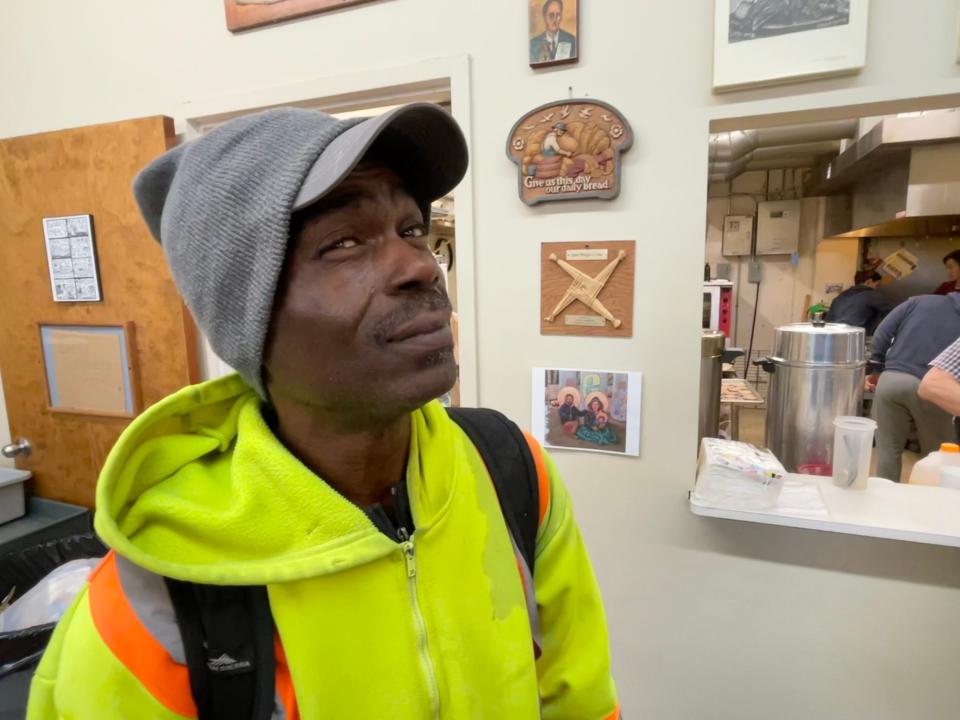
All of a sudden he was finding companionship at family dinners. There were others who would crack jokes about their time in prison or living with addiction. He remembers one of these rollicking conversations unfolding in front of his mother, who in a quiet moment said that she didn't know whether to laugh or to cry.
“Mama," Kemp told her, "this is part of our recovery. We have to talk about it. So laugh while you can, we’re laughing too. We can’t believe we did all this dumb s---."
Kemp's found that there's power in owning his story, no matter how sordid. That doesn't mean he's proud of it or he wants to stay in temporary housing at Motels4Now.
But it may mean that he has an easier time feeling grateful for his job at a local appliances store six days a week. Or for the cousin to whom he takes the bulk of his wages to prevent himself from feeding his addiction. Or for the moments he can forget himself in conversation with people who can relate to what he's been through.
Liv Helmen, a pink-haired and jaunty 26-year-old, worked at Motels4Now for two years before stepping down last week. Bearing witness to trauma takes its toll, she said. But as she looked over Our Lady of the Road's crowded tables of guests who chatted over plates of food, she saw Thanksgiving this way.
"Once you have something, you get used to a certain standard. You need more. And it’s just like a never-ending cycle," she said. "But if you’re living in a very pared-down sort of way, you kind of care about what really matters, which is your interactions with people and the food you eat and having a cigarette to share, you know?"
Ippolito knows it's true and she's trying to see it that way. She's grateful to have found some community in homelessness. When certain guests died during their stay at Motels4Now, she painted memorials in their honor and gifted them to grieving family members.
But she also can't forget the survival-of-the-fittest mentality that possessed some people on the streets. Though she wants to help others to heal, she's been exploited before. She knows it's time to hunker down in her new apartment, at a remove from the chaos, and do her own healing. There are legal documents to track down and job applications to submit and paintings to finish.
“My dream is to paint on the street corner ... and just make people happy, make my little money," she said. "I don’t need a lot of money because I’ve survived so long without it, but, unfortunately, in the world, you have to have some.
"My purpose?" she added. "I’m still trying to discover that."
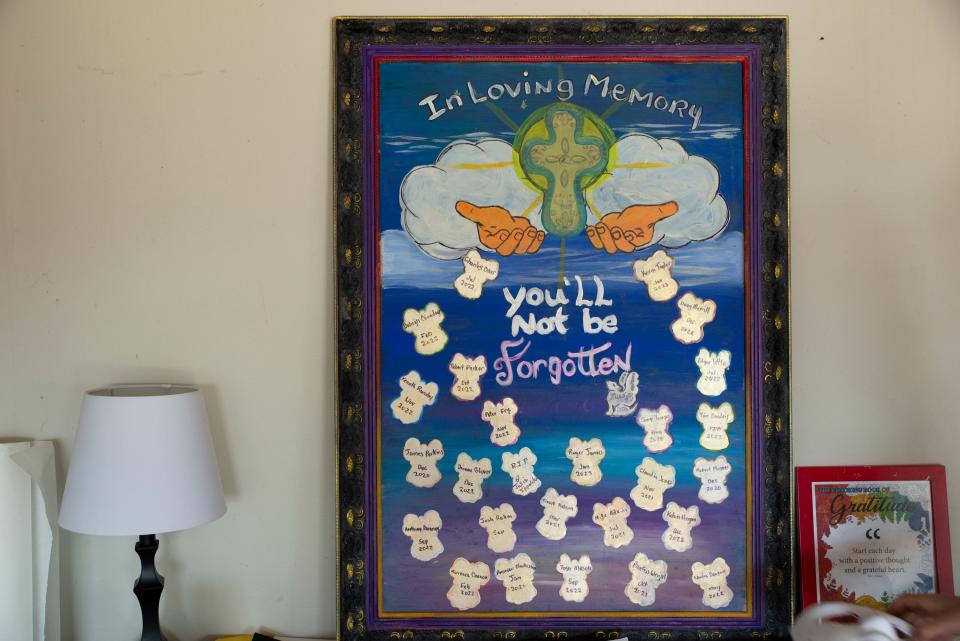
Email South Bend Tribune city reporter Jordan Smith at JTsmith@gannett.com. Follow him on X: @jordantsmith09
This article originally appeared on South Bend Tribune: What Thanksgiving, holidays mean for homeless in South Bend

